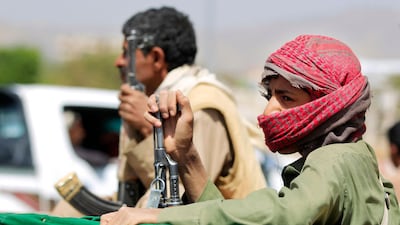The marked reluctance shown by Iranian-backed Houthi rebels to engage with Saudi Arabia’s bold initiative to end Yemen’s civil war has demonstrated beyond doubt which side is the true protagonist in this country’s long-running conflict.
Ever since the Saudi-led coalition launched the military campaign in support of President Abdrabbuh Mansur Hadi, the country’s internationally recognised leader, it has been Riyadh, and not the Houthis, which has attracted the lion’s share of the criticism for Yemen’s dire plight.
Aid agencies and human rights organisations have regularly accused the Saudis of causing the humanitarian disaster that now affects large swathes of the country, when in fact it is the Houthis, and their consistent refusal to engage with the UN-sponsored peace process, who are the real villains of the piece. Now, thanks to a Saudi-initiated peace plan announced earlier this week, the wider world is finally coming to understand this.

The Saudi plan includes delivering aid to Yemen's people and calling for a nationwide cease-fire supervised by the UN, as well as the reopening of Sanaa's airport and new talks to reach a political resolution to the conflict. In addition, restrictions on the Red Sea port of Hodeidah would be eased, allowing access for ships and cargo. Four ships have already passed through as a result of the initiative Income from the port, including taxes, would go to the central bank in Hodeidah in accordance with the earlier Stockholm agreement.
Announcing the plan, Saudi Foreign Minister Prince Faisal bin Farhan called on the Houthis to join the initiative. “We want the guns to fall completely silent,” Prince Faisal said. “However, the time frame is up to the Houthis now. We are ready to go to them. But they have to decide. Will they put the interests of Yemen first or the interests of Iran?”
The Saudi initiative has already won the full support of both the US and UN. In Washington, a State Department spokesman said the US welcomed “the commitment of Saudi Arabia and the internationally recognised government of Yemen to a new cease-fire plan”. And in a telephone call with Prince Faisal, Secretary of State Antony Blinken said he supported efforts to “end the conflict in Yemen, starting with the need for all parties to commit to a cease-fire and facilitate the delivery of humanitarian aid.”
Certainly, given the sheer scale of the humanitarian disaster sweeping the country, there has never been a greater need for a peaceful resolution of the Yemeni conflict. According to the latest figures compiled by aid organisations, the fighting, which began six years ago today has so far claimed 100,000 lives, while it is estimated that 4 million people have been displaced by the conflict during the past 7 years and around 80 per cent of the population are in need of some form of aid.
Yet, rather than trying to pursue diplomacy, recent evidence shows that the Houthis have only intensified their military campaign to extend their influence over the country, while at the same time continuing their attacks against targets in neighbouring Saudi Arabia.
As a result, the number of conflict frontlines in Yemen has increased from 33 in 2019 to 49 today, with the Houthis recently concentrating their efforts on trying to take control of the gas-rich Marib governorate, 170 kilometres east of the capital Sanaa. In some of the fiercest fighting witnessed in Yemen since 2018, hundreds are reported to have been killed.
The insistence of the Houthis and their Iranian backers on initiating a new offensive at a time when their are renewed diplomatic efforts to end the conflict have been greeted with dismay in Washington, where President Joe Biden, in one of his first acts after entering the White House in January, revoked the Houthis’ designation as a terrorist organisation in an attempt to win their backing for peace talks.
Instead, the Houthis have so far rejected the Saudi initiative, with Houthi chief negotiator Mohammed Abdulsalam declaring there was “nothing new” in the proposal.
Houthi intransigence over the new diplomatic effort has led to Tim Lenderking, the US Special Envoy for Yemen, to accuse the group of giving priority to a military campaign to take Marib over “suspending the war and moving relief to the Yemeni people”.
“Tragically, and somewhat confusingly for me, it appears that the Houthis are prioritising a military campaign” in Marib, Mr Lenderking remarked in an online forum.
A report issued by Human Rights Watch earlier this week claimed that Houthi forces had indiscriminately fired artillery and missiles into heavily populated areas located in the Marib governorate since February. Many of those affected by the Houthi attacks are the thousands of displaced Yemenis who are being housed in camps in the region.
Despite the upsurge in Houthi-inspired violence, Houthi officials say they will continue to participate in talks with Saudi officials, mediated by the government of Oman, to arrange a ceasefire. But such an outcome is unlikely as long as the Houthis maintain their preference for military action over diplomatic engagement.
Con Coughlin is a defence and foreign affairs columnist for The National


